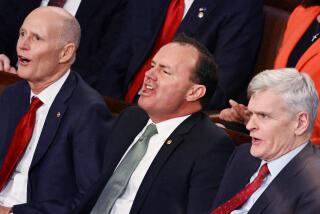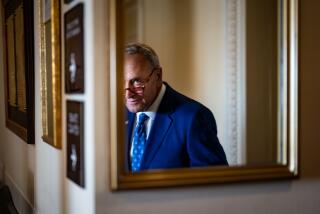Congress Won’t Tackle Medicare Overhaul
WASHINGTON — Key congressional leaders said Wednesday they will not pursue a comprehensive reform of Medicare, dealing a blow to President Bush’s campaign promise to make sweeping changes in the massive federal health care program for the elderly and disabled.
The two leaders, Sen. Charles E. Grassley (R-Iowa), chairman of the Senate Finance Committee, and Sen. Max Baucus (D-Mont.), the panel’s ranking Democrat, said they would instead focus on providing prescription drug benefits under Medicare.
The pair also said they would push for some modest changes in the program’s administration to improve its operation.
During his 2000 presidential campaign, Bush called for a comprehensive overhaul of the Medicare program that would involve enticing more of the elderly to move into private-sector HMOs rather than remain in the government program. Although he offered few details, Bush said his proposal would increase health care options for the elderly while making Medicare more financially secure.
Grassley and Baucus said their decision stemmed from the lack of a congressional consensus for such a sweeping reform of Medicare.
Instead, the starting point for their legislative efforts will be a scaled-back version of a bill originally designed to turn the Medicare system into more of a private-sector program in which different HMOs and insurance plans would compete for customers. That bill--similar to what Bush promoted during his campaign--was altered last year after it became clear there was insufficient support for an overhaul of the program.
New versions of both the comprehensive reform measure and the more limited alternative are scheduled to be introduced today by Sens. Bill Frist (R-Tenn.) and John B. Breaux (D-La.).
Baucus said he believes the more limited version is more likely to win support on Capitol Hill. Both he and Grassley said they hoped to have a bill moved through the Senate Finance Committee before the congressional recess in August.
Administration officials said Wednesday that Bush remains committed to seeking an overhaul of Medicare and will keep working to build support for his reforms.
Despite the damper placed on that effort by Grassley and Baucus, the president remains encouraged that it could happen “sooner rather than later,” said White House spokesman Scott McClellan.
Driving the push to overhaul Medicare has been both a demand to expand the program to cover prescription drugs and projected insolvencies in the program as the baby boom generation reaches retirement age. But cuts in Medicare spending and rising federal budget surpluses have delayed insolvency until at least 2025. As a result, much of the political debate on Capitol Hill has focused mainly on adding coverage of prescription drugs. Many members of Congress promised to do so when they ran for election in 2000.
Many Medicare recipients have supplemental insurance coverage that helps them bear the costs of prescription drugs. But between 30% to 35% of Medicare recipients have no drug coverage and even among those who do, the coverage plans are expensive and often pay for only limited amounts of medicine each year.
Bush in late January took a step toward addressing the prescription drug issue, unveiling a plan that would give states $48 billion over four years to provide drug coverage for low-income seniors only.
But congressional leaders of both parties quickly dismissed the plan as inadequate.
More to Read
Get the L.A. Times Politics newsletter
Deeply reported insights into legislation, politics and policy from Sacramento, Washington and beyond. In your inbox three times per week.
You may occasionally receive promotional content from the Los Angeles Times.










